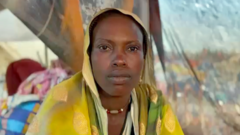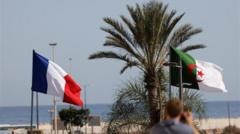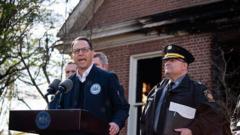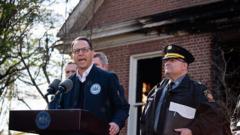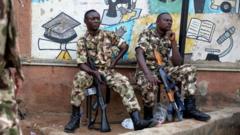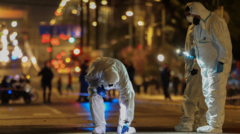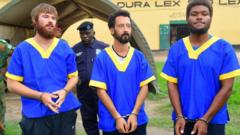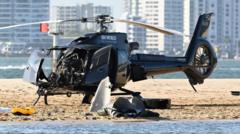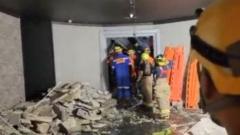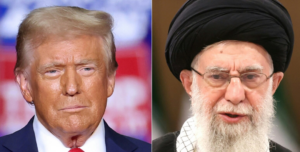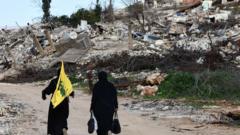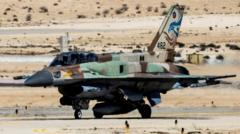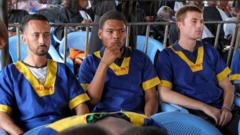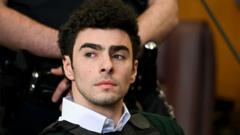Following a suspected car attack during a trade union rally in Munich, questions arise about the motives and backgrounds of the 24-year-old driver. Authorities step up investigations as injured victims span across various sectors, including children among those hurt.**
Munich Car Incident Sparks International Alarm and Calls for Action**
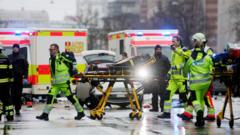
Munich Car Incident Sparks International Alarm and Calls for Action**
The recent car attack in Munich, involving an Afghan asylum seeker, has left 30 injured, prompting urgent inquiries and discussions on public safety.**
The bustling streets of Munich witnessed a harrowing incident on Thursday, as a 24-year-old Afghan asylum seeker drove his Mini Cooper into a crowd of participants at a trade union rally, injuring at least 30 individuals, according to local police reports. The attack is being treated as a suspected assault, and law enforcement officials are investigating the potential motivations behind the act.
The rally, organized by the Verdi trade union, was taking place amidst a public sector strike calling for improved pay and holidays for employees of day-care centers, hospitals, sanitation services, and public swimming pools. The collision occurred around 10:30 a.m. local time at the junction of Karlstrasse and Seidlstrasse, just as approximately 1,500 people were being directed to the event’s final destination a short distance away. In the chaos, police reportedly fired a shot at the vehicle before detaining the suspect on the scene.
The timeline of the attack coincides with significant international events, as police stated that the incident was not related to the upcoming Munich Security Conference, where the US vice president and Ukrainian president were scheduled to attend later that day. However, it raises significant concerns regarding public safety during large gatherings.
As of the latest updates, at least 30 people sustained injuries, with two reported in serious condition and several others termed to be in "life-threatening" situations. Children were also among the injured, prompting outrage from local officials, including Munich's deputy mayor, who described the incident as particularly heinous given the presence of families at the rally. Victims were transported to various medical facilities across the city, including specialized care at a children’s hospital.
The suspect, identified as Farhad N., is a resident of Munich with a complex immigration history. Reports indicate that his asylum application had been rejected, yet he remained in the country due to security issues stemming from his home nation. Despite initially being known to authorities, Bavarian officials emphasized that he had a valid residence and work permit and that the attack may not have been easily predictable.
Witnesses at the scene recounted the sudden and terrifying moments leading up to the crash, with many having to flee for safety into nearby shops as panic erupted. Descriptions from bystanders painted a picture of a chaotic environment, filled with screams and despair as people tried to assist the injured.
Authorities, including German Chancellor Olaf Scholz, have condemned the attack and called for strict repercussions for the suspect. Scholz affirmed that there could be no leniency for such actions. State officials, including Markus Söder, have underscored the importance of determining not just the particulars of this incident but also on addressing broader security concerns in Germany.
As investigations unfold, the Munich community and its leaders are grappling with the implications of this attack. The situation has ignited discussions on immigration policy and national security, highlighting the challenges of preventing such incidents in the future. As local agencies and forces take steps to ensure safety, the hope for a swift recovery blankets the city in a moment tinged with uncertainty and resolve.
The rally, organized by the Verdi trade union, was taking place amidst a public sector strike calling for improved pay and holidays for employees of day-care centers, hospitals, sanitation services, and public swimming pools. The collision occurred around 10:30 a.m. local time at the junction of Karlstrasse and Seidlstrasse, just as approximately 1,500 people were being directed to the event’s final destination a short distance away. In the chaos, police reportedly fired a shot at the vehicle before detaining the suspect on the scene.
The timeline of the attack coincides with significant international events, as police stated that the incident was not related to the upcoming Munich Security Conference, where the US vice president and Ukrainian president were scheduled to attend later that day. However, it raises significant concerns regarding public safety during large gatherings.
As of the latest updates, at least 30 people sustained injuries, with two reported in serious condition and several others termed to be in "life-threatening" situations. Children were also among the injured, prompting outrage from local officials, including Munich's deputy mayor, who described the incident as particularly heinous given the presence of families at the rally. Victims were transported to various medical facilities across the city, including specialized care at a children’s hospital.
The suspect, identified as Farhad N., is a resident of Munich with a complex immigration history. Reports indicate that his asylum application had been rejected, yet he remained in the country due to security issues stemming from his home nation. Despite initially being known to authorities, Bavarian officials emphasized that he had a valid residence and work permit and that the attack may not have been easily predictable.
Witnesses at the scene recounted the sudden and terrifying moments leading up to the crash, with many having to flee for safety into nearby shops as panic erupted. Descriptions from bystanders painted a picture of a chaotic environment, filled with screams and despair as people tried to assist the injured.
Authorities, including German Chancellor Olaf Scholz, have condemned the attack and called for strict repercussions for the suspect. Scholz affirmed that there could be no leniency for such actions. State officials, including Markus Söder, have underscored the importance of determining not just the particulars of this incident but also on addressing broader security concerns in Germany.
As investigations unfold, the Munich community and its leaders are grappling with the implications of this attack. The situation has ignited discussions on immigration policy and national security, highlighting the challenges of preventing such incidents in the future. As local agencies and forces take steps to ensure safety, the hope for a swift recovery blankets the city in a moment tinged with uncertainty and resolve.

